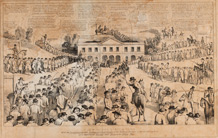
A satirical print from 1820 which depicts local landlords driving their tenants to the Castle Yard in Exeter to vote in their interests
Devon's turbulent political past revealed
Today it is hard to imagine mid-Devon as a hotbed of political ferment but things were quite different a century ago when politicians risked physical assault in towns like Newton Abbot and Bovey Tracey.
Charting the story of ordinary people’s engagement with politics in Devon over the last two hundred years forms a part of new exhibition at the Devon Heritage Centre.
History students from the University of Exeter have been using material from the Devon Heritage Centre’s collection to trace the development of democracy in Devon. Through themes of class, gender, media and violence stories such as the by-election in 1908 when suffragettes were pelted with rotten eggs and rolled in the winter mud and the windows of the Conservative Club were smashed illustrates the volatile nature of politics during this period. As part of the exhibition there is an image of Morrison-Bell, the Conservative candidate, addressing a crowd from Newton Abbott Constitutional Club following his victory in the 1908 Mid-Devon by-election. Some of the windows of the Club had been smashed by Bell’s opponents earlier in the campaign and there is a large police cordon in case of further violence.
Dr David Thackeray, a Historian at the University of Exeter involved in the exhibition said:“The Devon of 1813 is unrecognisable today, as elections were notoriously corrupt and tenants were driven to the polls to vote in the landlords’ interest. Only a tiny percentage of the electorate had the vote and all of them were men. But in many ways the culture of hustings lives on through the political meetings and posters.”
Devon also has much to be proud of, having elected the first woman to take her seat in the House of Commons, The Rt Hon Viscountess Astor, who served as an MP for Plymouth, Sutton Ward from 1919 to 1945. The county has also been home to a number of party leaders, such as Jeremy Thorpe and Michael Foot.
He added:“Tracing the often fractious and lively story of the development of democracy in Devon is particularly valuable at a time when the relationship between politicians and the people is being re-examined in the light of the recent MPs expenses scandal.”
Anjali Mukhi, a second year student studying History and Spanish reflects that her involvement in the exhibition has improved her appreciation for politics. She said: “Uncovering letters and examining electoral leaflets from the early 1900s brings to life the people I have only heard about in lecturers. It is a thrill to read telegrams from politicians and try and piece a story together from items in the collection. Helping to put the exhibition together has not only shown me the differences between political campaigns in the early 20th century and today, but it has also made historical figures seem far more three-dimensional, more than just names.”
The exhibition ‘Democracy in Devon’ runs from 16 March to 10 May, weekdays excluding Monday when the centre is closed. The exhibition is free-of-charge and is situated in the Devon Heritage Centre, located within Great Moor House, Bittern Road, Sowton, about three miles east of the centre of Exeter, and beside the Honiton Road Park and Ride Car Park.
Date: 19 March 2013
